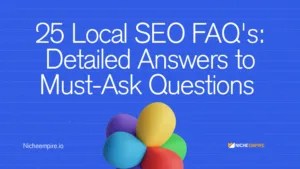Small Business Local SEO Guide
A survey by ESW in 2023 showed that 23% of US adults research a product they want online and then purchase it in-store. This suggests that online searching is the first step many people take when they need a product or a service.
As a small business owner, you can use local Search Engine Optimization (SEO) to get more customers around your business area. With the right SEO strategy, your business can top the local search results, directing online searchers to your store or website.
This is crucial because online searchers usually choose the businesses on the front page of search results. Owing to this, it is important for your small business to prioritize local SEO and make it to the first page, which is the essence of small business SEO.
These 10 local SEO strategies will help your small business turn local searches into loyal customers.
What is Small Business Local SEO?
Local SEO for small businesses is the practice of optimizing your business online to attract more customers through geographical searches on search engines.
This means your business will appear when online users in your area search for similar services or products on search engines.
Why is Local SEO Important for Small Businesses?
Local SEO is essential for small businesses because it can improve business reach within your locality without the need for traditional marketing methods or depending on paid ads.
Below are the reasons why small business owners need local SEO:
Increased Visibility
Local SEO campaigns increase your small business’s organic search by appearing and staying on top of local search results.
Targeted Traffic
Local business SEO attracts potential customers who are actively searching for your products or services.
Improve Brand Reputation
A consistent online presence makes your business credible; this will improve your small business SEO.
Customer Engagement
Local SEO allows you to showcase positive reviews and gain more trust and engagement.
Increase in Sales and Revenue
Reaching more local customers would increase your marketing goal, brand awareness, and revenue.
Recommended: Hyper Local SEO – Beginners Guide
How to Improve Small Business Local SEO Strategy
- Optimize Your Small Business Listing for Local Engine
Optimizing your listings are the basics of local SEO strategies for small businesses, and it’s vital you get them right. According to Exploding Topics, Google processes over 90,000 searches per second, and the US accounts for almost 20% of global Google traffic.
For this reason, listing your small business on Google My Business (GMB) sets you apart. First, you must claim and verify your business; it is easy.
- Go to google.com/business and search for your business name.
- Claim your business name by clicking “Claim this business.”. That is, if it is listed already,
- If your business isn’t listed, sign in to Google My Business, click “Add a business name,” and enter the relevant information.
- Then, go ahead and verify your business. Google will send you a verification code; your business will be verified once you enter it.
- You can then claim and optimize by adding images, videos, descriptions of your business, and opening hours.
- Ensure you provide accurate information because it is directly tied to Google Search and Maps.
You can also list your business on local directories and websites like:
- Yelp,
- ing Places for Business (Microsoft’s version of Google My Business),
- Yellow Pages
- SurePages
- and any local business online directories.
2. Utilize Local Keywords to Attract Local Visitors
Use the exact phrases or words (keywords) people use when searching for your products or services on search engines. Tools like Google Keyword Planner, SEMrush, or Ubersuggest can help you identify these local keywords.
Include these keywords in the main title of each website page, the meta description, and the content.
For example, a Florida plumber might find the keywords “Florida plumber” or “plumbing services in Florida” helpful. Using local keywords like these with location can improve your SEO ranking.
3. Leverage Online Reviews to Improve Your Local SEO
Politely ask customers to leave reviews on Google My Business or any online directory. It also applies to Facebook, Yelp, and other social media platforms on which your business is active.
Reviews improve your business credibility and local SEO ranking. Aim for positive reviews, but respond to all positive or negative reviews. It shows that you value your customer’s feedback.
This doesn’t only improve your company’s online reputation; it also keeps your listings active with recent activities.
4. Create Localized Content
Create content that addresses needs and wants specific to your location. Your potential customers will enjoy your web better when your content is valuable.
As a result, your local business will attract more visitors and get more engagement and higher SEO rankings.
In addition, localize your content by writing blogs or social media posts that capture local events and activities.
Share local industry news, customer testimonials, and helpful local guides that benefit locals and visitors alike. These are also useful for local SEO.
Include local keywords in your website content. Similarly, highlight any local collaborations you are a part of and mention local landmarks to establish a connection with your audience.
5. Optimize for Mobile
Optimizing your website for mobile devices is crucial for local SEO because most searches are done on mobile phones.
As stated by Statista, over 60% of online searches occur on mobile devices. It doesn’t only keep your visitors on your website for long; it’s essential for Google.
In 2023, Google announced it had completed its first mobile-first indexing, meaning Google had begun crawling and indexing websites from the angle of mobile users.
Make your website mobile-friendly to optimize for mobile users; search engines prioritize this, and you should do the same.
In the same way, ensure your website suits different screen sizes and devices, has good speed, and is easy to navigate.
6. Leverage Social Media for Local Engagement
Social media is a powerful tool for connecting with your local audience as a small business owner. Geotags and location-specific hashtags can increase your SEO organic rankings and help you drive up engagement with your local community.
A consistent social media presence increases your brand visibility and reputation and drives organic traffic to your website.
These platforms also help you track brand recognition, customer feedback, and audience analysis.
Do social signals directly impact search engines? Research by independent SEO professionals has found that they contribute to SEO ranking.
For instance, social shares can get you backlinks, mentions, and citations from other websites, which enhances your small business’s SEO.
In addition, joining and engaging in local online communities on social media is great for word-of-mouth marketing.
7. Use Schema Markup for Local SEO
Schema markup is a code that helps search engines understand the content of your website pages.
It tells local search engines all they need to know about your business, which is passed on to potential customers. One way Google utilizes schema markups on search results is to present rich snippets to search users.
Rich Snippets are search results that contain direct additional information on search engine results pages (SERPs) about a business, website, blog, entities etc.
Rich Snippets can include your product information and appealing visuals, local business information, event information, etc.
When search engines understand your website, they can rank it accordingly. You can achieve this by adding structured data (schema markups) across your site. Adding more information about your business using schema markups can make your business more attractive to users in search results, improving your SEO strategy. For example, star reviews, carousels, course information, event information, etc., can help increase your CTR (click-through rate), which is a positive SEO ranking signal.
You can manually implement schema markup or with a plugin like Yoast SEO or Rank Math.
8. Build Quality Backlinks for Small Business SEO
Backlinks are links from other websites that direct people to your site. They signal to search engines and customers that your business is credible and trustworthy.
Quality backlinks boost your local SEO rankings and help your business stand out. You can generate backlinks and increase business visibility by sponsoring local events or causes.
Charity, school, sports events, and community projects can also get your business listed on the websites of event organizers. This positions your business as a community supporter, enhancing your reputation.
9. Partner with Local Businesses
If you have a small business, collaborating with other companies in your community can boost your local SEO strategies. By promoting other local small businesses in your area, you can tap into their customer base.
This partnership has many mutual benefits— it yields results for you and your collaborating business. It increases your business citation, increases brand awareness, and can bring more customers to your store.
This strategy is essential for your small business because it impacts its visibility to your target audience.
Joint promotions, such as discounts or events hosting, are common ways local businesses can collaborate.
10. Monitor and Adjust Your SEO Strategy
You must monitor your local SEO strategies to ensure they are effective. Use Google Analytics to track website traffic, conversion rates, and user behavior.
Google My Business Insights is another tool for understanding how people interact with your business listing. Local SEO tools like Moz Local and BrightLocal also help monitor local SEO rankings.
Metrics to watch out for include:
- Local search rankings,
- Website traffic,
- Customer reviews,
- and conversion rates.
Read More:
Local Seo For Small Business
Local Seo Checklist
How to Increase Leads From Local Seo
Localization Seo
Hyper-Local SEO Strategies
Conclusion
Local SEO can give small business owners a competitive edge. Take advantage of it by listing your business on local search engines and building local links.
Also, leverage social media and create valuable content with local keywords that suit your audience.
Use these strategies to rank in local search results, and your business will get the recognition it deserves. However, SEO takes time to see results, and patience is vital.
Share this post with other small businesses.
Frequently Asked Questions
Is Local SEO Worth it for a Small Business?
Yes. Local SEO is worth it for small businesses and is an affordable way to attract new customers.
More people conduct mobile searches and use voice assistants when they need goods and services nearby.
For this reason, local SEO can increase your visibility and help you outshine your competitors.
How Can I Optimize My Small Business for Local SEO as a Beginner?
You can optimize your small business local SEO with these best practices:
- Claim your Google Business Profile (GBP) and include accurate and consistent information across the web.
- List your business in local directories like Yelp, Bing Places, and other online directories.
- Encourage reviews. Positive reviews build credibility because they are visible on search engine results.
- Use location-specific keywords in your website content and meta tags.
- Ensure your website is mobile-friendly and loads quickly.
How much does the average local SEO cost?
The cost of local SEO for your small business is not fixed and will depend on the service provider’s expertise.
- You can start with free tools like Google Business Profile for a DIY local SEO project.
- A freelancer will cost you a few hundred dollars for basic local SEO services.
- Getting comprehensive SEO services from an agency could cost you $1000 at the very least.
Small business SEO is a worthy investment; choose a budget and time frame that suit your goals.
The cost is an investment in increased visibility and long-term growth, so choose a package that aligns with your budget and goals.
Does SEO Really Increase Sales?
Yes, SEO can significantly boost sales by increasing your online visibility. Local SEO targets potential customers actively looking for your products or services in your area.
During search queries, people can see what you offer and your positive reviews, and they’ll likely become your customers.
How is Small Business Local SEO Done?
Local SEO for small businesses is done by optimizing your site for search visibility. Local SEO helps search engines, and people around you find your business and services. Use these steps to implement local SEO for your small business:
- You will have to optimize your Google Business profile.
- Optimize your on-page SEO using your target local keywords.
- Gain quality backlinks by leveraging off-page SEO techniques.
- Create quality content relevant to your local area with relevant keywords.
- Use the same business information across all platforms (consistent NAP – Name, Address, Phone).
- Monitor your local SEO strategy with tools like Google Analytics and Google Business Profile to track your local SEO performance.
How Can I Use Google Business Profile for Local Search Engine Optimization?
You must claim and verify your small business and set up your Google Business Profile correctly.
Include all essential information about your business and highlight your products and services to improve your SEO ranking.
How Can I Use Google Maps to Attract More Local Customers?
Claim your Google My Business Profile on search engines and other online business directories, such as Yelp and Bing Places for Businesses.
Optimize your business listing for small business SEO by using local keywords and adding service areas, categories, and business hours.



